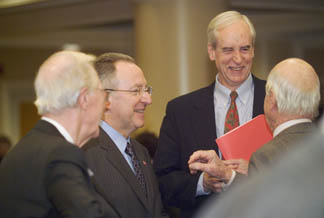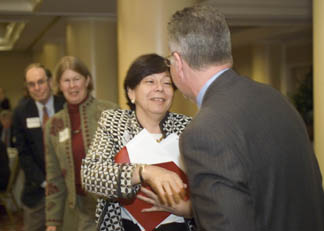An 'auspicious' day for Cornell is a 'very sad day' for Iowa
By Susan S. Lang

What Peter Meinig called "truly an auspicious day for Cornell," interim President Hunter R. Rawlings called "a very sad day in Iowa City, Iowa."
Said Rawlings: "All you have to do is read the papers. My heart goes out frankly to those Iowans … They love this man."
The man Rawlings was referring to at a luncheon at the Statler Hotel Jan. 21 was Cornell's newly named 12th president David Skorton, currently president of the University of Iowa.
Introducing Skorton for the first time to hundreds of members of the Cornell community, including faculty members and administrators, Meinig, chair of the Cornell Board of Trustees, said: "The [search] committee has completed its work with what I truly believe is an inspired choice. Although he would never describe himself as a Renaissance man, that's just what he is."
He noted that Skorton is a research scholar, author of more than 200 academic articles and two major texts, a national leader as well as a professional musician.
"David is a modest man … But modest men can be leaders and when necessary make tough decisions. David knows how to listen, how to bring people together, how to inspire them and how to be inspired by them, how to decide and when to decide," he said.
Meinig told the luncheon guests that Skorton will be a "steady, eloquent, persuasive spokesman" in Albany and Washington, D.C., Bombay and Beijing, New York City and in Ithaca -- "the home, the heart and soul of every one of us that is a Cornellian."
When he introduced Skorton, the new president was greeted with an extended standing ovation.
"I am very humbled by the choice you've made," Skorton said, calling the honor of being part of Cornell "thrilling and breathtaking." Cornell, he said is "a place of great excellence and courage at a time when it's easy to regress to a mean that's less and less impressive and less and less rigorous. We at Cornell have stayed the course to excellence."
Skorton said he was attracted not only to that excellence at Cornell, but also to the university's balance of the natural sciences, the humanities, fine arts and social sciences. "That balance is what makes every day worth getting up for as an academic leader," he noted.

Cornell's public service component also attracted him, he said. "It's the spirit of public service and the concern about community in its largest sense that Cornell has always evinced that was so, so attractive to us."
But most important, he said, was Cornell's diversity in all its dimensions -- intellectual, racial, ethnic, international, gender and interdisciplinary diversity.
Rawlings, who worked with Skorton at the University of Iowa, said, "David Skorton is a first-rate intellect. He has a great mind, he has an enormous intellectual curiosity. … He's genuinely interested in what the faculty are doing. He wants to know individually what's going on in their laboratories, in their poems and in their dances."
Rawlings said that Skorton is one of those men who doesn't see his work as a job but as an intellectual enterprise, which is what the university is -- a place where the goals are "great discovery and great teaching. He never forgets that. To me, that's the sign of a good administrator, someone who doesn't see the job as administration, but as furthering the work of faculty and students."
Rawlings then turned to the Skortons and said: "This is a really wonderful institution. … Cornell is really something quite remarkable. It has a character, it has a personality unlike other universities, and that character is full of many great qualities, but in particular, they include freedom, real intellectual freedom, the kind that's tough minded, the kind that won't make compromises. There's an irreverence here, which I think is quite wonderful, often humorous, yes it is, quite humorous, and when I think about Cornell and its freedom and its irreverence, I think about that great, great Cornellian, Archie Ammons."
He then read to Skorton, and his wife, Robin Davisson, three poems by the late Cornell poet, ending with the poem "Salute":
May happiness
pursue you,catch you
often, and,should it
lose you,be waiting
ahead, makinga clearing
for you.
"Salute to David and Robin," Rawlings said.
Media Contact
Get Cornell news delivered right to your inbox.
Subscribe